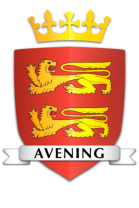

© Avening Parish Council 2023
“Preserve, Conserve, Enhance”
24 Arthur George King
Private: 6th Battalion Wiltshire Regiment From the Public Records, John King, father of Arthur King, is a mystery. By the census returns of 1881 and 1891, he was born around 1848 and 1849 at Sapperton but he cannot be specifically seen in the earlier census records. We have a record of him marrying Fanny Ludlow in the Stroud Registration District in 1877 and, in 1901, Fanny was a widow living with her family on Pound Hill. We cannot find a registered death for John, although he must have died around 1897. He was a stonemason and was employed at Peaches Farm and other farms around Hampton Fields. This is where Fanny was born in 1853 and prior to her marriage she was employed by the Ricardo family as a housemaid at Gatcombe House. The family lived at Hampton Fields from at least 1878 and this is where Arthur George was born in 1879. He was one of eight children, all of them being baptised in Minchinhampton. However, by 1901 the children had lost their father and the family had moved into Pound Hill. Arthur was then 22 and described as a yard labourer, his younger brother Wilford as a stonemason and a sister, Mildred, then 14, as a rug weaver. Unfortunately, Arthur's military records have not survived but his Medal Rolls tell us that he initially enlisted in the Dorset Regiment. That regiment are unable to tell us when he joined or why he left although it could have been that he was wounded and, on recovery, sent to one of the most needy units, which turned out to be the 6th Wiltshires. He faced Ludendorff’s final push which sprung from Operation "Michael", launched at the end of March 1918. Having ground to a halt on the advance on Amiens the German army turned north causing further havoc to the depleted British 5th Army. At the start of the week of Sunday the 7th of April, the 6th Wiltshires were sent in to the front line with 591 men. They were temporarily withdrawn on Friday the 12th with a strength of only 180 men. On that day they received reinforcements of a further 275 men and during the night of the 13th returned to the front as a force of 390. They were finally relieved by the 22nd French Division five days later, only 254 reaching their billets near Abeele. The battalion was so depleted that it effectively ceased to exist and was therefore disbanded. Arthur was one of the casualties and the Commonwealth War Graves Commission gives the date of his death as Saturday the 20th of April, but by that time the battalion had been relieved. However, the Stroud Gazette gives the same date but states that Arthur "died of wounds" so it supposed that at some time during April he was wounded and taken to a field hospital away from the fighting, where he died. He is buried at Mendinghem Cemetery, one of three cemeteries attached to three separate field hospitals. These field hospitals, situated in Western Belgium, near Ieper, were popularly known by troops as Mendinghem, Dozinghem and Bandaghem. He received two medals, the Victory Medal and the British Medal and is remembered with honour on our War Memorial tablets in Avening Church and on the front of the Memorial Hall. We have been unable to locate any relatives.
AveningArchive
WW1 Heroes





© Avening Parish Council 2023
AveningArchive
24 Arthur George King
Private: 6th Battalion Wiltshire Regiment From the Public Records, John King, father of Arthur King, is a mystery. By the census returns of 1881 and 1891, he was born around 1848 and 1849 at Sapperton but he cannot be specifically seen in the earlier census records. We have a record of him marrying Fanny Ludlow in the Stroud Registration District in 1877 and, in 1901, Fanny was a widow living with her family on Pound Hill. We cannot find a registered death for John, although he must have died around 1897. He was a stonemason and was employed at Peaches Farm and other farms around Hampton Fields. This is where Fanny was born in 1853 and prior to her marriage she was employed by the Ricardo family as a housemaid at Gatcombe House. The family lived at Hampton Fields from at least 1878 and this is where Arthur George was born in 1879. He was one of eight children, all of them being baptised in Minchinhampton. However, by 1901 the children had lost their father and the family had moved into Pound Hill. Arthur was then 22 and described as a yard labourer, his younger brother Wilford as a stonemason and a sister, Mildred, then 14, as a rug weaver. Unfortunately, Arthur's military records have not survived but his Medal Rolls tell us that he initially enlisted in the Dorset Regiment. That regiment are unable to tell us when he joined or why he left although it could have been that he was wounded and, on recovery, sent to one of the most needy units, which turned out to be the 6th Wiltshires. He faced Ludendorff’s final push which sprung from Operation "Michael", launched at the end of March 1918. Having ground to a halt on the advance on Amiens the German army turned north causing further havoc to the depleted British 5th Army. At the start of the week of Sunday the 7th of April, the 6th Wiltshires were sent in to the front line with 591 men. They were temporarily withdrawn on Friday the 12th with a strength of only 180 men. On that day they received reinforcements of a further 275 men and during the night of the 13th returned to the front as a force of 390. They were finally relieved by the 22nd French Division five days later, only 254 reaching their billets near Abeele. The battalion was so depleted that it effectively ceased to exist and was therefore disbanded. Arthur was one of the casualties and the Commonwealth War Graves Commission gives the date of his death as Saturday the 20th of April, but by that time the battalion had been relieved. However, the Stroud Gazette gives the same date but states that Arthur "died of wounds" so it supposed that at some time during April he was wounded and taken to a field hospital away from the fighting, where he died. He is buried at Mendinghem Cemetery, one of three cemeteries attached to three separate field hospitals. These field hospitals, situated in Western Belgium, near Ieper, were popularly known by troops as Mendinghem, Dozinghem and Bandaghem. He received two medals, the Victory Medal and the British Medal and is remembered with honour on our War Memorial tablets in Avening Church and on the front of the Memorial Hall. We have been unable to locate any relatives.WW1 Heroes



























